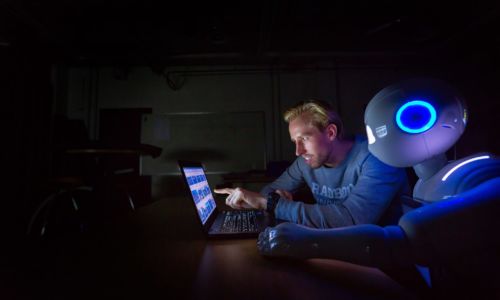Reflections on 500+ Days of ChatGPT: ’The mental model of higher education must change’
-
 Students in the Elinor Ostrom Building. Photo: Dick van Aalst
Students in the Elinor Ostrom Building. Photo: Dick van Aalst
OPINION - ChatGPT can be a reform opportunity for higher education, according to assistant professor Imtiaz Sifat from Radboud University and Saqib Sheikh from Nanyang Technological University. In their opinion piece, the researchers reflect on 500+ days of ChatGPT and take a look into the future of education.
In April 2024, ChatGPT passed the 500-day mark since its release. Its sudden emergence sparked a frenzy of debate in the higher education sector. Some extolled its benefits, though many remained skeptical due to the risks it poses to long-held academic conventions. As we endure the pain of keystrokes to author this piece, we acknowledge a non-zero probability that this article will not be read by a human but rather summarized by an AI bot.
Nonetheless, for the patient and orthodox (human) reader, our core thesis is this: we believe the question should not be whether students will or should use ChatGPT or similar tools; the debate should centre around how educators can guide them toward ethical use, critical evaluation, and the elevation of uniquely human skills.
Plagiarism
Opponents of ChatGPT and similar AI tools argue that they facilitate unprecedented levels of student plagiarism. With the ability to generate descriptive essays and other original content quickly, cheaply, and easily, students have a powerful tool to avoid preparing their own work. This can exacerbate the lack of critical thinking and research skills already evident among young people entering adulthood in a world of fake news and misinformation.
On the other hand, these potential drawbacks, including the risk of unnoticed bias and algorithmic limitations, may be addressable in future updates. Proponents see the technology as a valuable tool for educators, easing time-consuming tasks like creating assessments and grading schemes. Initial experiments with incorporating ChatGPT into the classroom have shown promising results. Used thoughtfully, this form of AI can be a valuable ‘learning companion,’ as termed by Ethan Mollick of the Wharton School of Business.
Reform opportunity
While some concerns about ChatGPT are unique and well-founded, they mainly manifest the limits of an educational model already facing calls for reform. If anything, ChatGPT has presented higher education with an opportunity for much-needed introspection and an overdue kick up the backside. Unlike other tech disruptions, AI tools offer the most realistic catalysis for a shift away from outmoded post-Industrial Revolution job-training focus towards a deeper, more holistic system of learning.
At the heart of the ChatGPT phenomenon lies the question of idea generation and originality. As similar tools become pervasive, policing plagiarism will become increasingly difficult. New efforts are needed to organically incentivize academic integrity. Educators should build relationships of trust with students, fostering an environment where producing original work is the natural expectation, not a means to clear a digital hurdle. Such a model would value tracking student learning and progress through practical and applicative assessments, rather than relying exclusively on graded outputs. To achieve this, students must believe that taking ownership of their work is in their own best interest, both in the immediate and long-term.
‘While some concerns about ChatGPT are well-founded, they mainly manifest the limits of an educational model already facing calls for reform’
So, what type of learning environment can encourage students to want to rather than to have to own their own work? Here is where the inner challenge of AI becomes clear. The prime function, so far, that doesn’t seem replicable yet by such tools is the originality of ideas. Yes, the tool can produce different forms of new fictionalized text and marketing content, but these are ultimately variations of existing themes in its own training data. Higher-level ideas and paradigms that break the mould are (still) mostly beyond its ambit. They remain the primary preserve of humans—for now.
Paths of future learning
The classroom of the near future, then, will need to emphasize ideation, the ability to conceptualize new forms and formats, and continuously push the boundaries of students’ contributions to collective knowledge. Leveraging AI tools for their ability to quickly synthesize existing knowledge should free up intellectual space for accelerating the drive toward novel ways of thinking.
The surplus cognitive labour battery can be directed to more pro-social, touch-the-grass activities, enhancing societal welfare. Dare we suggest a return to a Socratic mode of learning where dialogue and ideation take centre stage? Or the Renaissance period, when the rise of humanism challenged rote learning and lionized independent thought and creativity as educational goals? Thus, the higher education sector must suppress the urge to contain AI technology. However, students—the most direct stakeholders—must also expect and demand more from universities: ‘Teach us to co-create.’
We proffer some ideas that could be enabled by AI in higher education:
- Pass/Fail classes based on demonstrated learning rather than grades: a focus on mastery of concepts over numerical scores.
- A student-guided learning model and flexible course structures: allowing students more agency in their learning paths, leading to engagement and ownership.
- Prioritizing idea production over knowledge production: emphasize the development of ground-breaking concepts and frameworks.
- Enhancement of the in-class experience: AI can streamline preparation, freeing instructors for more meaningful interactions and mentoring. Resuscitate apprenticeship.
At the core of this transformation is the relationship of trust between teacher and student. It’s essential to investigate what factors contribute to a trusting, supportive learning environment. Thankfully, literature is starting to sprawl, documenting mostly positive user experiences, with some pitfalls and potential remedies.
All in all, the mental model of higher (university) education must change. Scepticism must yield to reasoned optimism. Embracing AI as an efficiency and productivity tool, rather than a threat, is crucial for long-term competitiveness in the marketplace of ideas. Said crudely, adapt or face obsolescence. On the bright side, universities can retain an edge in the transmission and practice of critical thinking skills, digital literacy, and the uniquely human capacity for innovation. These skills will maximize human capital ROI against the disruptive force of AI. Inaction, however, will incur substantial opportunity costs.




Frank Kruijsbeek schreef op 30 april 2024 om 16:27
The article, eloquent in style but ultimately typically reductive in substance, betrays the key danger found in most pleas favoring the integration of AI into more and more daily practices. The core problem is that the authors begin from an interpretation of our practices of knowledge (production) and education/learning that is (highly) overdetermined already. The result being that this interpretation leads to a conclusion that was practically unavoidable from the start.
The conception of knowledge and learning presented in this article is, however, philosophically questionable, ideologically contestable – and in my opinion, fundamentally flawed. It’s emphasis on “quickly” synthesizing, “continuously” pushing boundaries, drives toward novel thought through ‘accelerated drives’ go squarely against centuries worth of theories on knowledge that stress the need for slowness, pausing – contemplation, in short. But this fast and expansive view of knowledge is taken for granted and remains unexamined. The ideological characterization of knowledge as involving a “surplus cognitive labour battery” is hard to ignore; here the human mind and intellectual spirit are reduced to a tool, which must be drained but only as efficiently as possible in order to safeguard productivity in a maximization of human capital ROI. An entrepreneurial mindset, for sure. But is this that what our universities have or must become, the hotbed of industry and ROI on capitcal? Either way, the suggestion that such a nihilistic, outcome- and efficiency-oriented mindset could ever entail a form of continuity with Socratic mode of learning and its emphasis on aporetic understanding and learning is misguided at best, and depressingly cynical at worst.
It is no wonder that the authors champion the inclusion of AI tools in our university classrooms. After all, they have already adopted uncritically the exact mindset that has led to the all-trampling development of a technology which is parasitic in nature, serves the demands of an ever increasing and reckless efficiency.
FB1996 schreef op 2 mei 2024 om 15:04
Spot on
FB1996 schreef op 2 mei 2024 om 15:53
Spot on, Frank Kruijsbeek, bedoel ik natuurlijk.